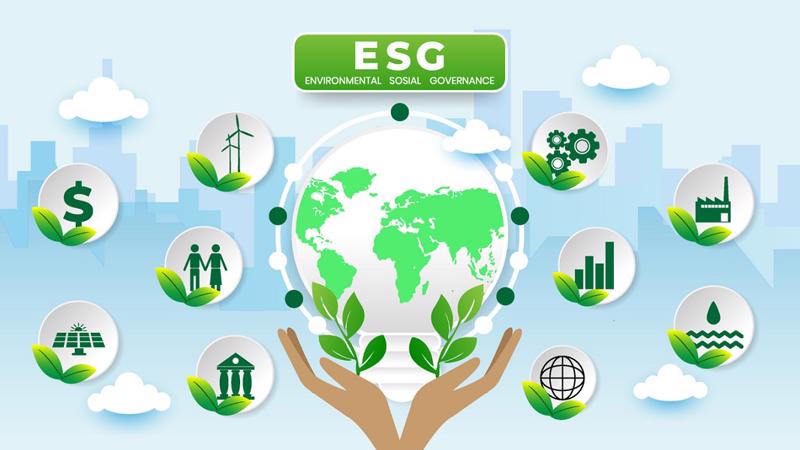Only 35% of listed businesses in Vietnam have made ESG commitments, while 58% plan to do so in the next 2-4 years. Listed businesses in Vietnam lack clear ESG regulations and lack of ESG leadership to promote commitment…

The latest report on “Listed businesses in Vietnam: Level of commitment to ESG (Environment, Society and Governance) and Sustainable Development Reporting practices” published by PwC on August 29 shows that Listed businesses in Vietnam are showing a high level of commitment, but are cautious in implementing ESG.
LACK OF ESG LEADERSHIP
Specifically, the ESG commitment rate of listed businesses is 93%, exceeding Vietnam’s average of 80%. But only 35% of listed companies have established an ESG plan, significantly lower than the average of 44%. More than half of listed businesses in Vietnam (58%) are and will be in the planning stage in the next 2-4 years.
The report identifies a lack of senior leaders participating in a focused role in promoting ESG commitments in listed enterprises in Vietnam. About two-thirds (64%) said businesses lack active board engagement and transparent governance of the ESG agenda.
Additionally, nearly half (44%) commented that their organization has no or clearly identified ESG leadership to help lead and execute ESG initiatives.
“This becomes a major challenge as the Board of Directors plays a pivotal role in overseeing ESG factors and integrating sustainability into long-term growth and decision-making strategies, to ensure Allocating and prioritizing necessary resources for ESG implementation”, assessment report.
Compared to the Asia Pacific region, the sustainable development report in Asia Pacific 2023 clearly shows that, compared to Vietnam, listed businesses in the Asia Pacific region are performing significantly better. in disclosing senior governance and their responsibilities towards ESG issues.
Among companies surveyed in Vietnam, 46% disclosed the responsibilities of the Board of Directors related to sustainability, 44% disclosed a sustainable governance structure and only 8% disclosed the number of members. The Board of Directors or management personnel have been trained in sustainable development.
These percentages are much lower than the Asia Pacific average – 84%, 79% and 36% respectively, the report states. More notably, no listed company in Vietnam disclosed the link between the remuneration of senior executives and their performance in sustainable management.
Meanwhile, goal setting is necessary for companies to track their progress in meeting ESG factors and adjust their strategies to take corrective action when necessary.
The report results also show that the majority of listed companies studied in Vietnam announced their short-term and medium-term ESG goals (84% and 70%, respectively). However, less than half (48%) disclose long-term goals, i.e. over 5 years, and only 8% disclose NetZero goals.
And the data on listed companies disclosing short-term, medium-term and long-term ESG goals in the Asia Pacific region is similar – an average of about 76%.
NEED TO CONTINUE IMPROVEMENT AND RAISE AWARENESS ABOUT ESG
In addition, climate change-related information disclosure is also becoming an increasingly important part of sustainability reporting, as is addressing transition risks and associated physical risks. regarding climate.
From 2021 to 2022, Vietnam is the country with the most significant improvement in the Asia Pacific region in identifying climate-related risks and opportunities, from 40% to 78%. This increase is driven by plans announced by Prime Minister Pham Minh Chinh in November 2021 – with a target of achieving net zero emissions by 2050, while also opening up opportunities for organizations to position.
However, there still exists a gap between listed companies in Vietnam and the Asia Pacific region – an average of 88%. This emphasizes the need to raise climate awareness among listed companies, especially when Vietnam is one of the countries heavily affected by climate change.
Commenting on the current status of ESG commitments and sustainable development reporting practices of listed businesses in Vietnam, Mr. Nguyen Hoang Nam, Deputy General Director, Leader of ESG Services and Audit Services, PwC Vietnam Nam, said: “There has been progress in the quality of sustainable development reporting of Vietnamese listed companies in recent times. However, businesses still need to continue to improve and raise awareness, especially in the field of green energy development and practicing ESG standards.”
Furthermore, according to PwC Vietnam representative, commitment and cooperation between many stakeholders is needed to achieve long-term impact as well as create a responsible business environment in Vietnam.
Listed businesses should proactively integrate ESG principles into their operations, taking advantage of existing structures and the organization’s abundant resources. At the same time, government agencies and regulators should develop clear policies to facilitate ESG transformation, along with detailed guidance on sustainability reporting practices.
To address the above challenges as well as to achieve balanced and comprehensive sustainability reporting, PwC recommends that listed businesses clearly understand their company goals, ESG strategies, and reporting aspirations. …
Data quality is critical to presenting information in a useful way to decision makers. The process of collecting and verifying information is quite complicated, so companies need to consider the whole system, not just the report.
At the same time, integrating ESG factors into business strategies, risk management processes and performance assessments through improved sustainability reporting can help save costs and create value. Castle.
 Bài viết hot:
Bài viết hot: 


